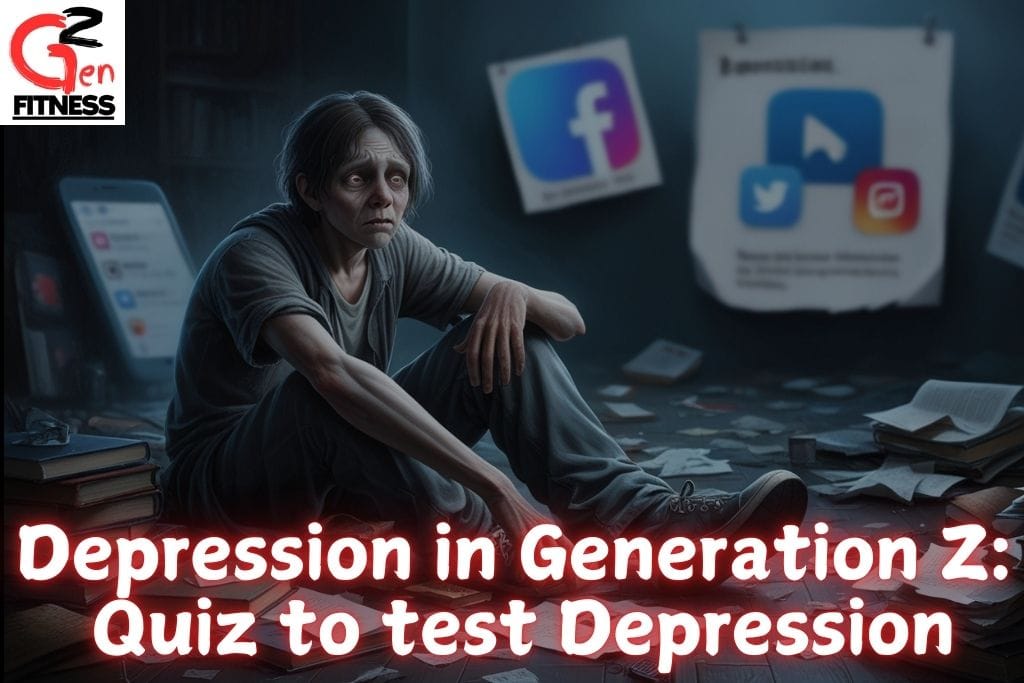

Introduction: Depression in Generation Z
Depression among Generation Z has become an increasingly significant issue. As one of the most tech-savvy, culturally diverse, and socially aware generations, Gen Z faces unique pressures that impact their mental health. The reasons for the high prevalence of depression among Gen Z are complex, stemming from factors such as social media influence, academic pressures, economic concerns, and global issues. Understanding the roots of depression in this generation is critical in addressing their mental health needs and providing proper support systems.
Who is Generation Z?
Generation Z, typically born between 1997 and 2012, is the first generation to grow up with the internet and digital technology as an integral part of daily life. They have been raised in a time of significant change, from rapid advancements in technology to increasing awareness of global issues such as climate change and social justice. These factors not only shape their worldview but also bring unique challenges, particularly when it comes to mental health. Gen Z individuals are often recognized for their desire for authenticity, their ability to mobilize for causes, and their openness toward discussing mental health.
Understanding Depression
Depression is a mental health condition that affects how a person feels, thinks, and handles daily activities. Common symptoms include prolonged sadness, a lack of interest in activities once enjoyed, changes in sleep patterns, and difficulty concentrating. In Gen Z, depression often manifests through social withdrawal, irritability, and a heightened sense of hopelessness. Unlike previous generations, Gen Z faces unprecedented challenges related to their constant connectivity, leading to unique patterns of depression, often exacerbated by the digital world.
Is Gen Z More Depressed?
Yes, research and surveys over recent years suggest that Gen Z is experiencing higher rates of depression and anxiety compared to previous generations. There are several factors contributing to this trend:
Factors Contributing to Depression in Gen Z
Social Media and Digital Impact
Social media has revolutionized how Gen Z communicates, shares, and learns, but it also brings challenges. The constant pressure to maintain a curated image, the fear of missing out (FOMO), and cyberbullying are common issues linked to social media. Research has shown that excessive use of platforms like Instagram and TikTok can exacerbate feelings of inadequacy, loneliness, and anxiety, all of which are risk factors for depression.
Academic Pressure and Career Anxiety
Gen Z is highly focused on academic and professional success, often driven by the competitive environments of their schools and universities. The pressure to excel academically and secure a stable career amidst economic instability creates anxiety and stress. This pressure can lead to burnout, feelings of failure, and depression when expectations are not met or when goals seem out of reach.
Economic Uncertainty and Financial Stress
Generation Z has been raised during a time of economic instability, witnessing the effects of the 2008 financial crisis and the economic impact of the COVID-19 pandemic. Many in Gen Z are anxious about their financial futures, fearing job insecurity and economic downturns. These financial stressors contribute significantly to their mental health challenges, particularly as they enter the workforce and face high costs of living and student debt.
Global Issues and Existential Concerns
Gen Z is acutely aware of global crises like climate change, social injustice, and political instability. This awareness, while empowering, can also be overwhelming, creating what some refer to as “eco-anxiety.” The constant exposure to distressing global events contributes to feelings of helplessness and hopelessness, deepening depression in many young individuals.
Social Isolation and Pandemic Impact
The COVID-19 pandemic intensified mental health issues across all generations, but its effects on Gen Z were especially severe. Forced isolation during formative years has impacted their social skills, relationships, and emotional health. For many, the lack of face-to-face interactions during critical developmental periods has led to lasting feelings of isolation, loneliness, and increased rates of depression.
Quiz to test Depression:
Depression Self-Assessment Quiz
This quiz is not a diagnostic tool. If you have concerns about your mental health, please seek help from a professional.
Disclaimer: This self-assessment test is not a diagnostic tool and is intended for informational purposes only. The results are not definitive and should not be used to diagnose depression or any other mental health condition. Mental health is complex, and only a licensed mental health professional can provide an accurate diagnosis and appropriate treatment.
If you have concerns about your mental health or are experiencing symptoms of depression, please consult a qualified mental health professional. Seeking help early can be beneficial, and support is available.
Signs and Symptoms of Depression in Generation Z
Depression in Generation Z may show up differently than in older generations. Common symptoms include persistent sadness, social withdrawal, irritability, and changes in sleep or appetite. Unlike older generations, who may internalize their struggles, Gen Z is more open about expressing their mental health struggles, often sharing their feelings on social media. However, this transparency can sometimes mask the severity of the issue, as expressions of depression online can be mistaken for attention-seeking rather than genuine calls for help.
The Role of Social Media in Gen Z’s Mental Health
Social media can be a double-edged sword for Generation Z. While platforms allow for connection and self-expression, they can also lead to comparison, envy, and low self-esteem. Studies indicate that prolonged social media use is associated with depression, particularly among young people who engage in “doomscrolling” or experience cyberbullying. Social media platforms contribute both positively and negatively to mental health, depending on the user’s habits and the type of content consumed.
The COVID-19 Pandemic and Its Lasting Impact
The pandemic has left a lasting impact on Gen Z’s mental health, increasing rates of depression and anxiety. Many missed out on critical life milestones like graduations and social gatherings, leading to a sense of loss and disorientation. The isolation and disruption of routines caused by lockdowns have had a ripple effect on their social skills and mental well-being, with many still grappling with the aftereffects of pandemic-related stress.
Stigma Around Mental Health in Gen Z
One of the more positive aspects of Gen Z’s approach to mental health is their reduced stigma around it. Unlike previous generations, who often viewed mental health issues as a sign of weakness, Gen Z is more open about discussing mental health and seeking help. This shift has been supported by increased mental health awareness campaigns and the rise of mental health influencers. However, while stigma has decreased, the challenges of accessibility and affordability of mental health care remain prevalent.
Coping Mechanisms Commonly Used by Gen Z
Gen Z uses a variety of coping mechanisms to handle depression. Positive strategies include engaging in physical activities, practicing mindfulness, and attending therapy sessions. However, negative coping mechanisms, such as excessive screen time, substance use, and online escapism, are also prevalent. These can temporarily relieve feelings of depression but often worsen mental health in the long run.
The Role of Education and Awareness
Educational institutions have a unique role in supporting Gen Z’s mental health by providing resources, fostering safe spaces, and encouraging open dialogues. Many schools and universities now offer mental health services, workshops, and counseling. Increasing mental health literacy helps Gen Z better understand their feelings and seek appropriate help, ultimately promoting resilience and coping skills.
Family Dynamics and Support Systems
Family support plays a critical role in the mental well-being of Generation Z. This generation is generally open to discussing mental health with family members, yet they often feel misunderstood by older generations who may not fully grasp the unique challenges they face. Open communication, empathy, and understanding from family members can significantly reduce the severity of depressive symptoms. Supportive family dynamics can foster a safe environment where Gen Z individuals feel comfortable discussing their struggles, helping to build resilience and effective coping strategies.
Additionally, family counseling can bridge generational gaps, providing both the young person and their family with tools to navigate mental health issues together. Creating awareness about mental health among family members can lead to early intervention, which is essential in managing depression effectively. However, lack of support or invalidation from family can intensify feelings of isolation and depression, underscoring the importance of positive family involvement.
Professional Help and Treatment Options
Generation Z has access to a range of professional help and treatment options, but barriers such as stigma, affordability, and accessibility can impact their utilization. Traditional treatment options like therapy and counseling have become more widely accepted among Gen Z, with many individuals viewing therapy as a valuable tool for managing mental health. Cognitive-behavioral therapy (CBT), mindfulness-based therapies, and group counseling are particularly popular among young people.
Additionally, digital mental health services, such as therapy apps and online counseling, have grown in popularity, providing Gen Z with convenient, accessible resources. Mental health apps can offer supportive exercises, mood tracking, and even access to licensed therapists, breaking down barriers that might prevent young people from seeking in-person help. Medication may also be recommended in certain cases, often alongside therapy, as part of a comprehensive treatment plan. However, it’s crucial to approach professional help with patience and an open mind, as mental health treatment is a process that requires consistency and commitment.
Our latest posts: https://genzfitness.in/
How Society Can Better Support Generation Z’s Mental Health
Society plays a crucial role in shaping the mental health landscape for Generation Z. Educational institutions, workplaces, and policymakers all have a part in creating environments that support mental well-being. Schools can implement mental health curriculums, offering classes or workshops that teach students about mental health, resilience, and coping mechanisms. Workplace policies can also include mental health days and provide resources for employees, helping to reduce the stigma around taking care of mental health.
At the policy level, governments can increase funding for mental health services, improve access to mental health care, and address the economic challenges that many young people face. Accessible mental health resources, affordable therapy options, and financial support systems can greatly alleviate some of the stressors that contribute to Gen Z's depression rates. Community programs, such as youth centers and mental health awareness campaigns, can also provide safe spaces and promote open discussions about mental health.
Future Outlook: Addressing Depression in Generation Z
The future of mental health support for Generation Z looks promising, as awareness around mental health continues to grow. With increased openness and advocacy from this generation, there is potential for a more compassionate society that prioritizes mental health. The ongoing integration of mental health discussions into mainstream culture and media is helping to normalize these conversations, encouraging Gen Z and future generations to view mental health care as essential to overall well-being.
In the long term, initiatives that promote mental health education, provide accessible resources, and reduce stigma will be critical in addressing depression and fostering resilience in Generation Z. By supporting mental health at every level—from family dynamics to social institutions—society can ensure that future generations are better equipped to handle the unique challenges of an increasingly complex world.
Conclusion
Depression in Generation Z is a multifaceted issue influenced by digital media, economic pressures, academic and career challenges, and global issues. This generation faces unique challenges and stressors, but they also bring a refreshing openness to mental health discussions that has the potential to create lasting societal change. By understanding and addressing the specific factors that contribute to depression in Gen Z, society can take meaningful steps to provide support, education, and resources that empower this generation to manage their mental health effectively.
FAQs
1. How can parents recognize depression in Gen Z children?
Parents should look for signs like prolonged sadness, withdrawal from family or social activities, changes in sleep or eating habits, and irritability. Open communication and creating a safe environment where children feel comfortable expressing their emotions are crucial.
2. Why is social media so impactful on Gen Z's mental health?
Social media can affect mental health by promoting unrealistic standards, fueling comparisons, and enabling cyberbullying. Constant exposure to curated content can lead to feelings of inadequacy, which can exacerbate symptoms of depression.
3. What makes depression in Gen Z different from other generations?
Gen Z experiences depression differently due to their digital upbringing and the unique social, economic, and global pressures they face. The constant connectivity of social media also shapes how they express and experience mental health issues.
4. How can schools help in combating depression among Gen Z students?
Schools can implement mental health programs, offer counseling services, and educate students on coping mechanisms. Creating an inclusive, supportive environment is essential for promoting mental well-being among students.
5. What are some effective coping strategies for Gen Z dealing with depression?
Some effective coping strategies include seeking therapy, practicing mindfulness, limiting social media use, engaging in physical activity, and building a supportive social network. Finding healthy, sustainable coping mechanisms can make a significant difference in managing depression.
Read our latest book: Eat Your Problems







